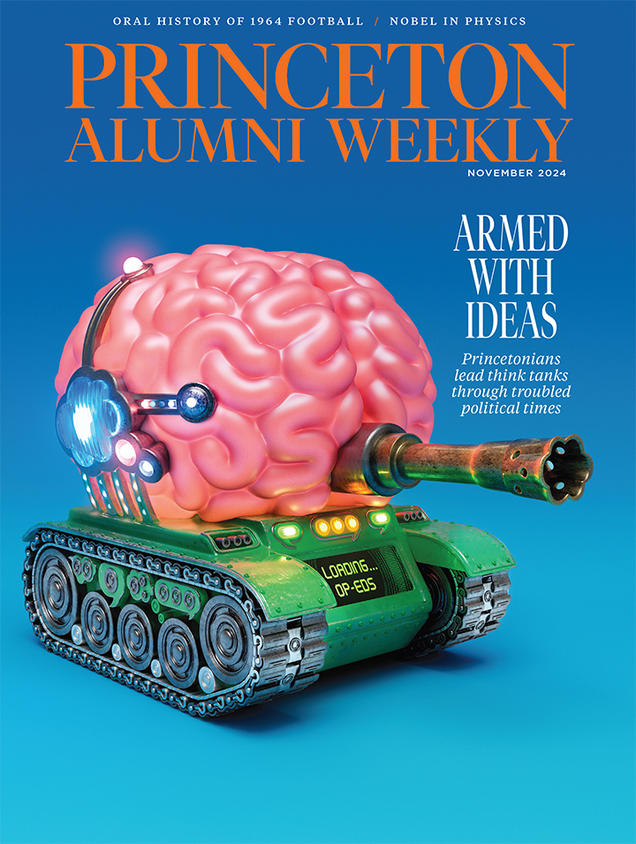
When author and professor Andie Tucher ’76 began researching her family tree, she uncovered fascinating stories that have evolved over time. Her new book,Happily Sometimes After, spans nearly 400 years of American history and 12 generations of family members.
PAW Tracks is also available on iTunes — click here to subscribe
TRANSCRIPT:
This episode of PAW Tracks marks a bit of a departure. Typically we speak with alumni about their memories of Princeton. This time, our topic is family history. Andie Tucher ’76 is an associate professor at the Columbia University Graduate School of Journalism and the author of Happily Sometimes After, a new book that covers the lives of her ancestors in America, dating back nearly 400 years. She spoke with PAW about researching their stories.
I started researching the family history because my mother got interested in doing a family tree for her mother, who was old and cranky and needed something to keep her busy. And I had just started a graduate degree in American history. So I thought, well, I can point her in the right direction. I can guide these poor people who don’t know enough about history. But I got more and more interested and involved when it became clear that the family — which we had never known — had roots that went so far back in the New World. The first family member who we can trace came here in 1619, which is before the pilgrims. [The family members] came to Jamestown, Va. And when I began to realize the breadth of experience that my family members had witnessed, I became more and more intrigued by trying to figure out if I could see how they talked about it.
I was a historian, I was a journalist, I was interested in people’s stories. I was interested in trying to figure out how to make truth; how to tell true stories; how to gauge the truthfulness of stories that other people were telling; how to use stories that weren’t true to figure out why they weren’t true — not to yell at anybody, not to point a finger at anybody, but to figure out why you tell a story a certain way and what that does for you. And this was just juicy ground for me.
The first story that made me think about what storytelling meant was the one I found about the massacre, so-called, in 1644 in the Virginia settlements. It was told by family members over the years, as I discovered. I found traces of it embedded in many different sources over many different eras, so I could follow how it unfolded.
The story — by the time I saw it, the most recent version of it — involved a mass assault by the Native Americans on the Virginia settlements where the English colonists lived. There was a family, John and Sarah Woodson. He was a physician, he was coming home. She was in the house. The Indians struck him down within sight of the house. They surrounded the house. The brave woman inside built up the fire in the fireplace so that when one Indian tried to come down the chimney he fell and boiled to death in the pot. She brained another one with the roasting spit. A man who was inside the house, a shoemaker, shot the rest of them with this great big gun, which was passed down in the family and now is allegedly held in the Virginia Historical Society.
And my first thought was, “Whoa, this is the coolest thing ever! I come from this great stock.” And the more I read it, the more I began to think, now wait a minute: Indians are going to climb down a chimney when there’s a fire at the foot? They’re not that stupid. The sons were supposedly hidden in places within the house. One son was hidden in the potato hole. Turns out there were no potatoes in Virginia in that era, so there could have been no potato hole. Another son was under the washtub. Inventories of Jamestown show there were no washtubs there because that was a luxury and this was a town on the bank of a river. Who needed a washtub?
So my second thought, after “wow how cool” was oh, this is all just a fantasy. This is so disappointing to think that people believed this.
My third thought was that this is even more interesting than I thought because it makes me think about why they told this story, and what this story says about the lives they really did lead. And because it was so well preserved in many different versions over the decades, I was able to look at how it unfolded and try to make sense of where it began and where it began to change. And it seemed to me that the story itself wasn’t really told widely until the American Revolution, by someone who I believe was the great-great-grandson of the couple. And it seems to me that he was telling a story about the American Revolution, which was cloaked in the adventures of his forefathers, because it touched on a lot of themes that were very important for people living in the Revolution. The idea of a massacre, because the Boston Massacre had been important, and there were many British actions against the Americans that were called massacres. The wife who was being strong our tough in the absence or death of her man. Many women were seen as being important as deputy husbands in the Revolutionary era. So it seemed to me that the story was not terribly true about Virginia in 1644, but had some really true things to say about Virginia in 1776.
I queried a lot of people I was coming across during my research to ask them, “When did you first hear this story? Were you told this by your great-grandfather? Were you told this by older family members who had heard it from older family members?” None of them had. They had all found it in the same book that I had, a genealogical history of 1915 that many genealogists are able to find, it’s readily available. And I think people tend to be very un-critical of family stories, but particularly a family story where they don’t even know who first told it to them, when it comes down to them embellished with some kind of authority of history. People don’t want to think that the stories told about their family were told by people who were not telling the truth. They want to believe it — they want to believe that they’re special. Everyone wants to feel special, and most of what these stories do is tell you, you’re special because you descended from these really smart, tough people who could prevail. That’s a good thing to know. And they prevailed in different ways, even if they didn’t shoot down an Indian.
But it’s hard for people to, I think, sit down and critically view a family story that has the authority of, you know, it’s always been told this way. There’s something really powerful about that. And I chose not to do a lot of challenging when I talked to present-day people — in fact, I didn’t talk to a lot of present-day people. That wasn’t my purpose. My purpose was not to debunk, or to make them feel bad. My purpose was to see how stories are used, and I was able to see that this story is still kind of important for people, maybe for reasons that are less savory in some respects — we’ve been here the longest so we count the most; you worry about that — but I think most people were simply interested to see that they had such an intimate connection with American history. And I didn’t want to start stamping on that.
In writing her book, Tucher relied largely on written sources, including some unexpected gems.
I spent a lot of time in Kentucky, where the family ended up very early in Kentucky’s settlement. I went to little historical societies, [read] little local histories. I looked in legal documents. I looked in pension records.
Pension records turned out to be really a wonderful source, because the U.S. government, relatively early on, figured out ways to compensate soldiers for their service, but the soldiers had to do a little work before they got compensated. The soldiers had to tell the story of how they had served and what they had done. They were talking — some of them Revolutionary-era soldiers, probably very common people, not used to talking to officialdom. And they’re trying to explain what they did and remember that 30 years earlier, they fought somewhere or other and they went somewhere or other. So you are looking at what a very old man, who in one case has had a very miserable, sad impoverished life. His whole life has been stepped on had terrible experiences. And he’s now at the age of 70, trying to tell an officer of the court something that’s going to get him money.
You can only imagine how he processes this experience, and what he chooses to say and how he chooses to say it. This was a man who I believe was at Valley Forge with George Washington, which hundreds of people have lied about ever since. I think he was actually there — his unit was there, records suggest he was there. He never mentioned it.
What he talked about was a weird little skirmish with a small Indian tribe off in the west of Pennsylvania, because that was a success to them. They vanquished the Indians, and they didn’t lose any of their own soldiers.
Valley Forge was miserable for the people who were there. Valley Forge was uncomfortable and cold and scary and people died. So he’s choosing a different way to remember his past in this unusual situation of having to tell a story to get money.
Tucher shows how, in family history, a person’s life is often reduced to a few biographical details and one or two stories that survive. With that in mind, we asked her: What would you like future generations to know about you?
That’s a scary question, isn’t it?
I think in part, it’s going to be a lot harder for many of us to keep any secrets we want to keep, or to shape our ways in many of the ways that our ancestors were able to shape them, because there is so much more stuff out there about us. And as we know, the Internet has no secrets.
I would like to be seen as someone who listened to stories, who listened to how people wanted to talk about their lives, their experiences. Who was open to hearing about how people want to talk about their pasts, rather than correcting it, rather than judging it. So as a historian with a very open mind, I guess is one identity I would like.
I also want to be thought of as a teacher. I have found that I love teaching in a way that I had never expected. I didn’t expect to be a teacher. I expected to be a journalist and just write stories. And as a teacher, you help people shape their own. That has been very satisfying.
Paw in print

November 2024
Princetonians lead think tanks; the perfect football season of 1964; Nobel in physics.
